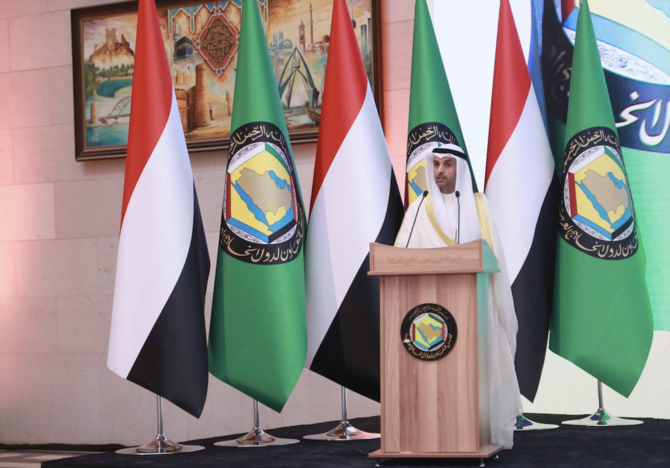RIYADH: The most comprehensive peace talks involving Yemen’s warring factions kicked off on Wednesday in Riyadh as the Coalition to Restore Legitimacy in Yemen announced a truce that is hoped would help end the devastating conflict.
Hundreds of Yemeni politicians, tribal leaders, and current and former military and security officials, took part in the conference. The Houthis have refused to attend the GCC-initiated talks.
Opening the conference, Nayef Falah Al-Hajraf, secretary-general of the GCC, urged the participants to set aside their differences and find a comprehensive solution to end the war.
He stressed that the Gulf bloc would back the outcomes.
“The success of the Yemeni-Yemeni consultations is not an option but a duty that requires everyone to (bear) the national responsibility and to reject all causes of division and internal disparities,” Al-Hajraf said, hailing the coalition’s quick response to the GCC demand for a truce.
The coalition on Tuesday night announced it would halt military operations in Yemen to smooth the way for the success of the talks.
Hans Grundberg, the UN’s Yemen envoy, who is currently brokering similar talks — but with fewer people — in the Jordanian capital, said Riyadh has long played a significant role in facilitating peace initiatives.
“Riyadh has offered a space for dialogue leading to important agreements, such as the GCC Initiative and the Riyadh Agreement. We need the region’s support as much as ever to move toward an inclusive political process under the (UN’s) auspices,” he said.
The war, he added, has ruined the country’s state institutions, social fabric and economy, and claimed the lives of thousands of Yemeni civilians.
“The longer the conflict goes on, the more severe the impact on civilians, and the more difficult to reverse the damage. The Yemeni people need to see a clear path out.”
The envoy said his latest efforts to convince the warring factions to stop fighting during the month of Ramadan have yielded some results.
“For over two months I have been engaging all parties on reaching a truce and we are making progress. Yemen needs a truce. I am engaging with the parties with a sense of urgency to reach this truce by the beginning of Ramadan.”
Tim Lenderking, US envoy to Yemen, also expressed his country’s support for the UN and GCC calls urging an end to all hostilities during Ramadan.
“We remain committed to helping UN-led efforts to advance a durable, inclusive resolution to the conflict,” he said, urging the attendees to reach a solution that would end the humanitarian crisis in Yemen.
“On behalf of the United States, I convey our sincere hope that everyone here today will seize this important opportunity to work together to identify tangible steps that will improve the lives of all Yemenis.”
For the first time in years, the talks in Riyadh have brought together rival political, military and tribal figures from Yemen, including senior members of the General People’s Congress and leaders of the pro-independence Southern Transitional Council.
Speaking to Arab News during the conference, participants expressed hope that the large gathering of Yemenis would agree on a way forward.
“The situation in Yemen is disastrous. There is a severe shortage of fuel and people are very poor. We hope that Yemenis will unite their voices during the talks and the international community, mainly Saudi Arabia and the GCC, help them implement the outcomes,” Abdullah bin Ali Jaber, a tribal leader from the southeastern province of Hadramout, said.
The Houthis have reportedly rejected the GCC invitation to join the talks and escalated their military operations across Yemen, mainly in the central province of Marib.
Local officials and media reports have indicated that the Houthis mounted significant attacks on government troops outside the city of Marib, apparently exploiting the space created by the halt of coalition airstrikes.
Yahiya Abu Hatem, a military analyst, told Arab News: “The Houthis have turned down all calls for peace and met them with an escalation. This group is Iran’s tool to undermine security in the Arab world.” He said Yemenis should resolve their differences and “aim their weapons at the Houthis.”


























